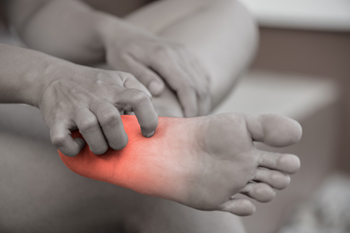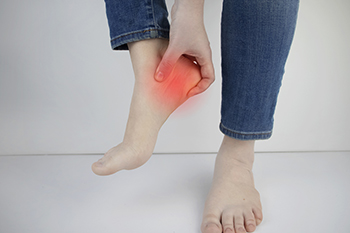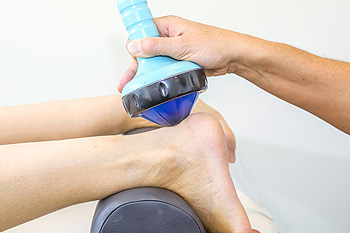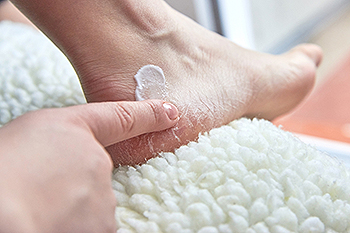
Peripheral neuropathy, or neuropathy, is a term for nerve damage to the peripheral nervous system. These are nerves that are outside of the brain and spinal cord. Peripheral neuropathy can create various symptoms which may impair a person’s balance and their perception of their body and its movement. These symptoms include numbness, pain, and weakness in the feet. Older adults are more prone to developing peripheral neuropathy as a complication of diabetes, which can cause them to have foot drop, difficulty walking up stairs, rising out of their chairs, and standing up from a crouching position. All of this can increase the elderly person’s already heightened risk of falls. If you or someone you love is experiencing any of the symptoms mentioned here, it is suggested that you make an appointment with a podiatrist for a full examination and evaluation.
Neuropathy
Neuropathy can be a potentially serious condition, especially if it is left undiagnosed. If you have any concerns that you may be experiencing nerve loss in your feet, consult with Howard Waxman, DPM from Pleasant Valley Podiatry. Our doctor will assess your condition and provide you with quality foot and ankle treatment for neuropathy.
What Is Neuropathy?
Neuropathy is a condition that leads to damage to the nerves in the body. Peripheral neuropathy, or neuropathy that affects your peripheral nervous system, usually occurs in the feet. Neuropathy can be triggered by a number of different causes. Such causes include diabetes, infections, cancers, disorders, and toxic substances.
Symptoms of Neuropathy Include:
Those with diabetes are at serious risk due to being unable to feel an ulcer on their feet. Diabetics usually also suffer from poor blood circulation. This can lead to the wound not healing, infections occurring, and the limb may have to be amputated.
Treatment
To treat neuropathy in the foot, podiatrists will first diagnose the cause of the neuropathy. Figuring out the underlying cause of the neuropathy will allow the podiatrist to prescribe the best treatment, whether it be caused by diabetes, toxic substance exposure, infection, etc. If the nerve has not died, then it’s possible that sensation may be able to return to the foot.
Pain medication may be issued for pain. Electrical nerve stimulation can be used to stimulate nerves. If the neuropathy is caused from pressure on the nerves, then surgery may be necessary.
If you have any questions, please feel free to contact one of our offices located in Willoughby Hills and Broadview Heights, OH . We offer the newest diagnostic and treatment technologies for all your foot care needs.
 The plantar fascia is a rubber band-like tissue that helps form the heel and connect the toes with the heel. When this tissue gets damaged, it can become inflamed and torn. This injury can be very painful, especially in the morning. There are many possible causes of plantar fasciitis, such as having to stand while working, being obese, having diabetes, putting undue pressure on your heels, having tightened calf muscles or arches, or impacting your heels repeatedly in the same spot. Your podiatrist may first suggest cutting back on any activity that is impacting your heels, or losing weight if your plantar fasciitis is linked to your weight. They may also prescribe custom orthotics to cushion the heels, taping to ease pain, night splints to keep your plantar fascia slightly stretched overnight, or specific plantar fascia stretches. Certain anti-inflammatory medications can help reduce pain and inflammation as well. Contact a podiatrist to discuss these plantar fasciitis treatment options and more.
The plantar fascia is a rubber band-like tissue that helps form the heel and connect the toes with the heel. When this tissue gets damaged, it can become inflamed and torn. This injury can be very painful, especially in the morning. There are many possible causes of plantar fasciitis, such as having to stand while working, being obese, having diabetes, putting undue pressure on your heels, having tightened calf muscles or arches, or impacting your heels repeatedly in the same spot. Your podiatrist may first suggest cutting back on any activity that is impacting your heels, or losing weight if your plantar fasciitis is linked to your weight. They may also prescribe custom orthotics to cushion the heels, taping to ease pain, night splints to keep your plantar fascia slightly stretched overnight, or specific plantar fascia stretches. Certain anti-inflammatory medications can help reduce pain and inflammation as well. Contact a podiatrist to discuss these plantar fasciitis treatment options and more.
Plantar fasciitis is a common foot condition that is often caused by a strain injury. If you are experiencing heel pain or symptoms of plantar fasciitis, contact Howard Waxman, DPM from Pleasant Valley Podiatry. Our doctor can provide the care you need to keep you pain-free and on your feet.
What Is Plantar Fasciitis?
Plantar fasciitis is one of the most common causes of heel pain. The plantar fascia is a ligament that connects your heel to the front of your foot. When this ligament becomes inflamed, plantar fasciitis is the result. If you have plantar fasciitis you will have a stabbing pain that usually occurs with your first steps in the morning. As the day progresses and you walk around more, this pain will start to disappear, but it will return after long periods of standing or sitting.
What Causes Plantar Fasciitis?
There are some risk factors that may make you more likely to develop plantar fasciitis compared to others. The condition most commonly affects adults between the ages of 40 and 60. It also tends to affect people who are obese because the extra pounds result in extra stress being placed on the plantar fascia.
Prevention
There are a variety of treatment options available for plantar fasciitis along with the pain that accompanies it. Additionally, physical therapy is a very important component in the treatment process. It is important that you meet with your podiatrist to determine which treatment option is best for you.
If you have any questions, please feel free to contact one of our offices located in Willoughby Hills and Broadview Heights, OH . We offer the newest diagnostic and treatment technologies for all your foot care needs.

Extracorporeal Shock Wave Therapy (ESWT) is a non-invasive treatment for many painful and chronic conditions such as plantar fasciitis and Achilles tendonitis. This type of treatment is performed outside the body (extracorporeally) and works by targeting the damaged tissue or bone with acoustic shock waves using ultrasound to precisely pinpoint the area. The acoustic sound waves create a controlled reaction within the tissue that ultimately regenerates cells and blood vessels, resulting in repairing the tissue and relieving pain. Unlike surgery, ESWT requires no prolonged recovery time. If you are suffering from plantar fasciitis or a painful Achilles tendon issue, you might benefit from consulting with a podiatrist to discuss whether you are a good candidate for ESWT.
Shockwave therapy is a treatment commonly used to treat various injuries and conditions, particularly plantar fasciitis in the feet. To learn more, consult with Howard Waxman, DPM from Pleasant Valley Podiatry. Our doctor can provide the care you need to keep you pain-free and on your feet.
Shockwave Therapy
Shockwave therapy is a new treatment option designed to treat bone conditions such as tennis elbow, shoulder pain, and others. Shockwave therapy uses high intensity sound waves that are directed to the affected tissues of the body with pinpoint accuracy. The effects are very beneficial, leading to a production of collagen fibers, eliminating inflammation.
Who Benefits from Shockwave?
Shockwave is recommended for patients suffering from heel pain and associated problems. Heel pain is a common condition which can be caused by obesity, overexertion, and spending a substantial amount of time on hard floors with your feet exposed and unsupported.
Fast and Easy
The therapy is actually a simple process that can leave patients feeling better the very next day. Shockwave therapy is not as dramatic as it sounds. It enables more blood flow to effected areas, addressing the source of the problem and allowing treatment to last for a long time.
Treatment & Recovery Time
Shockwave treatment will enable your feet to recover quickly. This is especially important since surgery is not required. It is cost effective and does not require the use of anesthesia. This treatment is a better option to surgery, since it is proven safe.
If you have any questions, please feel free to contact one of our offices located in Willoughby Hills and Broadview Heights, OH . We offer the newest diagnostic and treatment technologies for all your foot and ankle needs.

The foot condition known as cracked heels can be unsightly and uncomfortable. In severe cases, it can be difficult to walk and an infection may develop. There are several reasons why this ailment occurs. These can include dehydration from not drinking enough water or from using harsh soaps on the feet. Additionally, there may be existing medical conditions that can cause cracked heels like eczema and psoriasis. Some people may experience this condition from living in extremely cold environments or from using excessively hot water while taking a shower. Mild relief may be found when the feet are washed and dried thoroughly, followed by applying a good moisturizer. It may also help to refrain from wearing shoes that have an open back as well as drink plenty of fresh water daily. Cracked heels can require professional medical attention and it is suggested that you use the services of a podiatrist who can effectively treat this condition.
If the skin on your feet starts to crack, you may want to see a podiatrist to find treatment. If you have any concerns, contact Howard Waxman, DPM from Pleasant Valley Podiatry. Our doctor can provide the care you need to keep you pain-free and on your feet.
Cracked Heels
It is important to moisturize your cracked heels in order to prevent pain, bleeding, and infection. The reason cracked heels form is because the skin on the foot is too dry to support the immense pressure placed on them. When the foot expands, the dry skin on the foot begins to split.
Ways to Help Heal Them
Ways to Prevent Cracked Heels
If you are unsure how to proceed in treating cracked heels, seek guidance from a podiatrist. Your doctor will help you with any questions or information you may need.
If you have any questions, please feel free to contact one of our offices located in Willoughby Hills and Broadview Heights, OH . We offer the newest diagnostic and treatment technologies for all your foot care needs.